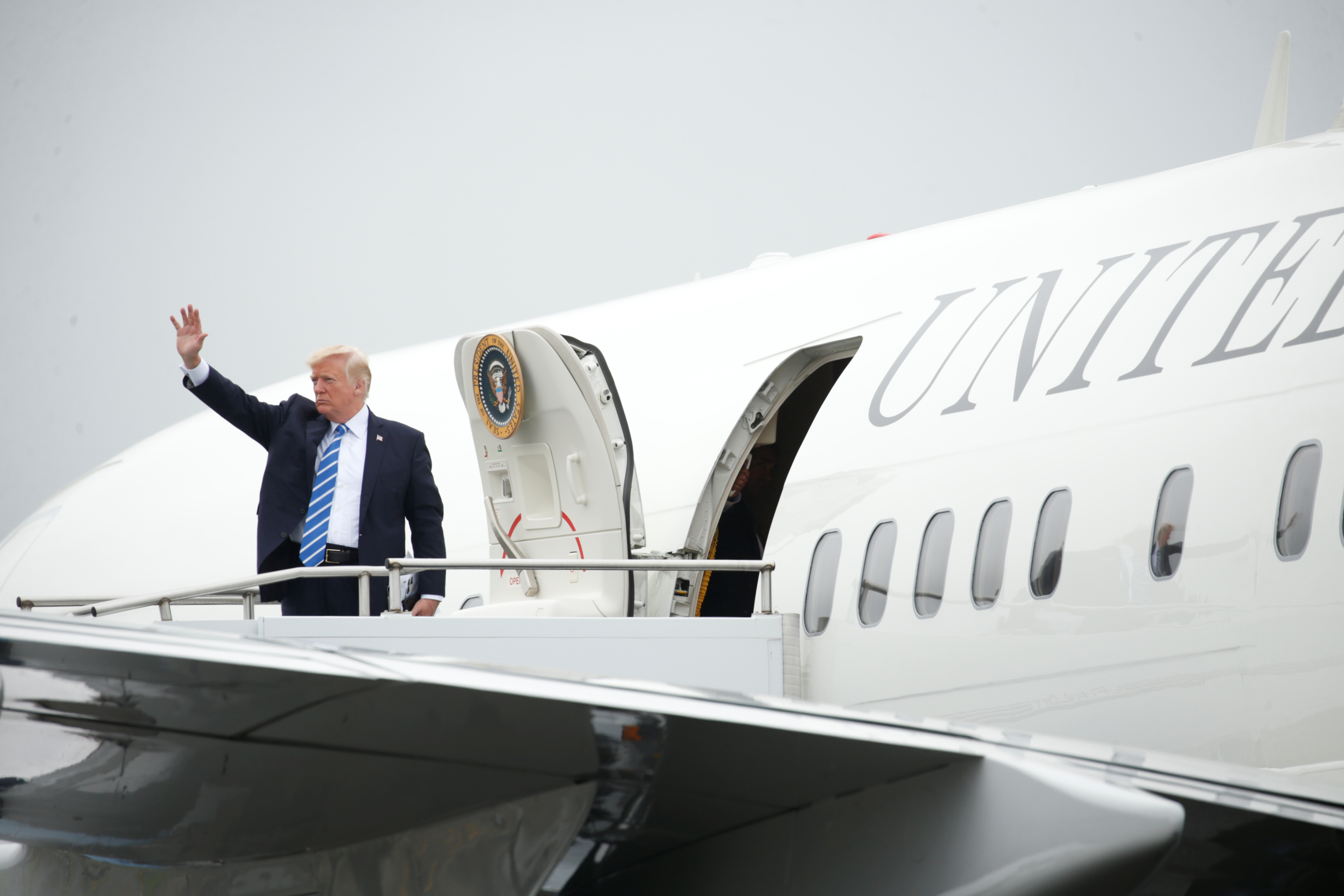The most consequential trip of the Trump presidency
Let's pray Trump's trip to Asia is incredibly boring


A free daily email with the biggest news stories of the day – and the best features from TheWeek.com
You are now subscribed
Your newsletter sign-up was successful
Get ready, because President Trump heads to Asia on Friday! What could possibly go wrong?
Well, to be honest, a lot, and very quickly — especially if our president decides to go off script, like he loves to do. Asia's leaders are looking to Washington to rein in a rogue North Korea that can build a new nuclear weapon every six or seven weeks, and they don't want to see a lot of drama.
Now, being the good Republican I am, I have faith — but how can I not be at least a wee bit concerned?
The Week
Escape your echo chamber. Get the facts behind the news, plus analysis from multiple perspectives.

Sign up for The Week's Free Newsletters
From our morning news briefing to a weekly Good News Newsletter, get the best of The Week delivered directly to your inbox.
From our morning news briefing to a weekly Good News Newsletter, get the best of The Week delivered directly to your inbox.
While some of the rhetoric coming out of the White House has been unhelpful and sometimes downright inappropriate, Team Trump has just the right mix of national security pros to keep the president focused on what could very well be the biggest foreign trip of his presidency — if he heeds their wise counsel. This is clearly a make or break series of visits, with the president visiting South Korea, Japan, China, Vietnam, and the Philippines, and senior officials in the White House I have spoken to in the last few days get it. As one senior State Department official put it to me: "We plan to go over and impress — mark my words."
So what should the administration do during the visit to not only convey their hyper focus on North Korea but also to signal to nervous allies, such as South Korea and Japan, and potential foes, like China, that America is clearly in it for the long-term in Asia?
Here are a few key recommendations to ensure this presidential visit is one to remember — and not because Trump decides to challenge a North Korean soldier along the DMZ to an arm-wrestling match.
1. Get the communications strategy right: I know this is rather boring and tedious, but what we say, how we say it, and how consistently we say it matters. America has some key policy choices to make when it comes to North Korea that seem very much up in the air. For example, are we willing to talk to Kim or not? Are we willing to engage in diplomacy or not? How would we react if North Korea tries an atmospheric nuclear test in the South Pacific or engages in kinetic actions that kill people, as it has done it in the past?
A free daily email with the biggest news stories of the day – and the best features from TheWeek.com
As someone who studies North Korea for a living, I have a good idea about what the administration is trying to do when it comes to the so-called "hermit kingdom," but mixed messages in the form of interviews and statements need to end. The administration needs consistent messaging on what America's actual North Korea policy is. The stakes are just too high.
2. Don't get into another war of words with North Korean leader Kim Jong Un: Calling Kim "rocket man" or "little rocket man," as Trump has, is funny, but unhelpful. Veiled threats like saying "we will have no choice but to destroy North Korea" are even more unhelpful. It's time to cool down the rhetoric — for all our sakes.
3. Nominate a U.S. ambassador to South Korea: If we're going to enact any comprehensive and successful North Korea strategy, we need an ambassador to South Korea — now. Considering the stakes, the Trump administration has no excuse for not nominating one, and it needs to quickly fill the position. According to reports, Victor Cha, a former national security council official in the George W. Bush administration, was supposedly on the cusp of being nominated back in August. He's a perfect choice — so just announce it already.
4. Getting chummy with China is a mistake: President Trump is finding out fast that going all in on a personal relationship with Chinese President Xi Jinping — or, as Trump claims some people refer to Xi, "the king of China" — is a big mistake. Beijing does not give a hoot about Trump's personal touch; for China, this is just business. And it wants to make sure things in northeast Asia, while tense now, become stable once again — with America doing what it always does with North Korea: accepting the status quo and moving on to bigger problems.
And China has an even bigger reason to hope for stability when it comes to North Korea. Beijing can't aspire to become the dominant power in the region, and indeed a global superpower, if Washington is fighting wars on the Korean peninsula or upping its missile defenses or arming Tokyo and Seoul to the teeth. Look for Xi to woo the Donald — but let's hope Trump does not fall for the trap.
Trump needs to tell Xi point blank that China needs to enforce all existing U.S. Security Council resolutions and help Washington get Pyongyang to the bargaining table. If not, well, all bets on trade, challenges in the South China Sea, or even Taiwan and beyond are off. That will get their attention.
5. Be as boring as possible: Quite simply, the president needs to convey a message that America can be a source of stability for Asia at a time when a nuclear war is a very real possibility. Trump needs to show he can be a boring, conventional American president. He needs to shake a lot of hands, do a lot of listening, lay a lot of wreaths, and make a lot of boring speeches. In fact, the less about this trip we hear back in D.C. the better. Heck, I would just be happy if he stayed off Twitter for a week. But, I have a feeling that might be asking too much.
Harry J. Kazianis is director of defense studies at the Center for the National Interest, founded by former U.S. President Richard M. Nixon.
-
 Is Andrew’s arrest the end for the monarchy?
Is Andrew’s arrest the end for the monarchy?Today's Big Question The King has distanced the Royal Family from his disgraced brother but a ‘fit of revolutionary disgust’ could still wipe them out
-
 Quiz of The Week: 14 – 20 February
Quiz of The Week: 14 – 20 FebruaryQuiz Have you been paying attention to The Week’s news?
-
 The Week Unwrapped: Do the Freemasons have too much sway in the police force?
The Week Unwrapped: Do the Freemasons have too much sway in the police force?Podcast Plus, what does the growing popularity of prediction markets mean for the future? And why are UK film and TV workers struggling?
-
 Epstein files topple law CEO, roil UK government
Epstein files topple law CEO, roil UK governmentSpeed Read Peter Mandelson, Britain’s former ambassador to the US, is caught up in the scandal
-
 Iran and US prepare to meet after skirmishes
Iran and US prepare to meet after skirmishesSpeed Read The incident comes amid heightened tensions in the Middle East
-
 Israel retrieves final hostage’s body from Gaza
Israel retrieves final hostage’s body from GazaSpeed Read The 24-year-old police officer was killed during the initial Hamas attack
-
 China’s Xi targets top general in growing purge
China’s Xi targets top general in growing purgeSpeed Read Zhang Youxia is being investigated over ‘grave violations’ of the law
-
 Panama and Canada are negotiating over a crucial copper mine
Panama and Canada are negotiating over a crucial copper mineIn the Spotlight Panama is set to make a final decision on the mine this summer
-
 Why Greenland’s natural resources are nearly impossible to mine
Why Greenland’s natural resources are nearly impossible to mineThe Explainer The country’s natural landscape makes the task extremely difficult
-
 Iran cuts internet as protests escalate
Iran cuts internet as protests escalateSpeed Reada Government buildings across the country have been set on fire
-
 US nabs ‘shadow’ tanker claimed by Russia
US nabs ‘shadow’ tanker claimed by RussiaSpeed Read The ship was one of two vessels seized by the US military
